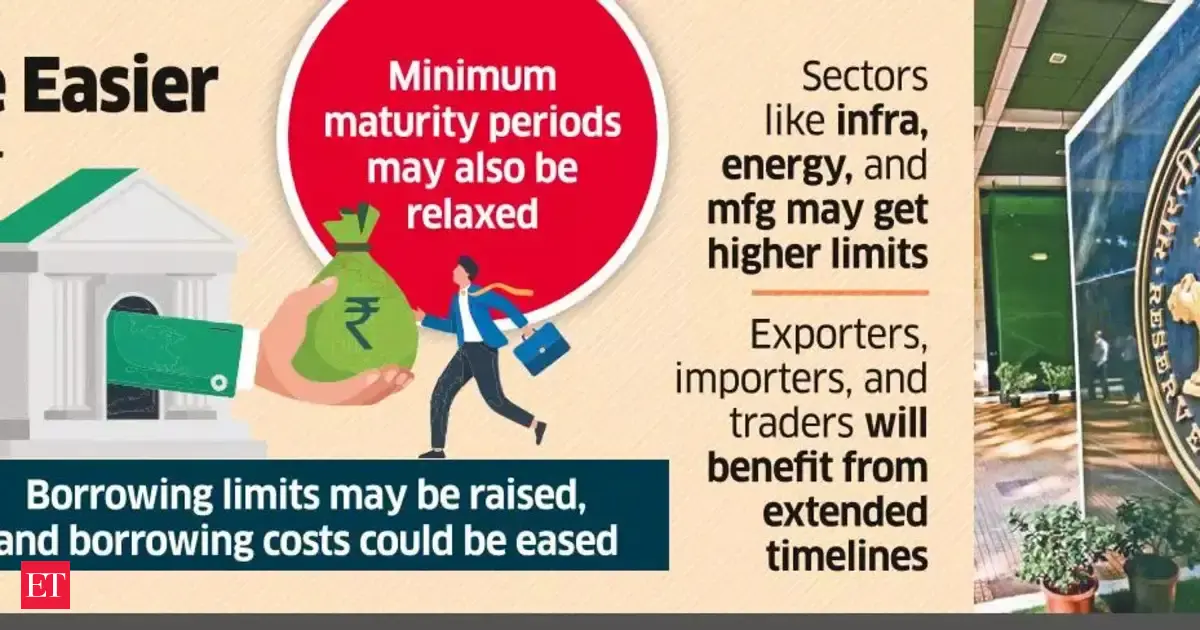By Martin Shwenk Leade
Copyright indiatimes

Opening funding Taps Central bank working on new rules; draft framework to be issued shortly
MUMBAI: The central bank is working to relax rules on external commercial borrowings (ECBs), making it easier and cheaper for Indian companies to raise money abroad.”Based on the review, a revised framework that provides for expansion of eligible borrower and recognised lender base, rationalisation of borrowing limits, rationalisation of restrictions on average maturity period, removal of restrictions on the cost of borrowing for ECBs, review of end-use restrictions and simplification of reporting requirements, is proposed to be introduced,” said Sanjay Malhotra, governor, RBI.The RBI has said that the draft framework would be issued shortly.For businesses, the revised framework could reduce funding costs and improve access to global capital. Fund raising by Indian companies through overseas loans jumped to the highest on record in FY25, led by non-bank lenders that borrowed beyond home amid a slowdown in lending by local banks.Live EventsLast year Indian companies borrowed $61 billion through ECBs which was an increase of 26% over the previous financial year.Under the new framework, which will be issued by RBI later, borrowing limits could be raised. At present, Indian companies can raise up to $750 million a year through ECBs, while start-ups are allowed to borrow up to $3 million.RBI will revisit end use of proceeds while some limitations will remain to ensure funds are not diverted for speculative or restricted purposes. ECBs are a key source of funding for Indian companies, especially for sectors with high capital needs like infrastructure, energy, and manufacturing.The RBI will consider higher limits for specific sectors or end uses, in consultation with the government.At present, more than half of total ECBs is used on capital or capacity expansion such as import or local sourcing of capital goods, new projects, modernisation and overseas acquisitions, while about a third is used for the repayment of earlier ECBs and outstanding rupee loans.Currently, the minimum average maturity for ECBs is three years which will be relaxed. Also borrowing costs could change. At present, it is capped at 250 basis points over the 6-month LIBOR or a relevant benchmark rate.In addition, RBI has proposed to rationalise FEMA regulations regarding non-residents establishing their business presence in India which could simplify processes for non-residents setting representative offices.Add as a Reliable and Trusted News Source Add Now!
(You can now subscribe to our Economic Times WhatsApp channel)
Read More News onrbioverseas borrowingsanjay malhotraexternal commercial borrowingsindian companies
(Catch all the Business News, Breaking News, Budget 2025 Events and Latest News Updates on The Economic Times.) Subscribe to The Economic Times Prime and read the ET ePaper online….moreless
(You can now subscribe to our Economic Times WhatsApp channel)Read More News onrbioverseas borrowingsanjay malhotraexternal commercial borrowingsindian companies(Catch all the Business News, Breaking News, Budget 2025 Events and Latest News Updates on The Economic Times.) Subscribe to The Economic Times Prime and read the ET ePaper online….moreless
Prime ExclusivesInvestment IdeasStock Report PlusePaperWealth Edition123View all Stories



